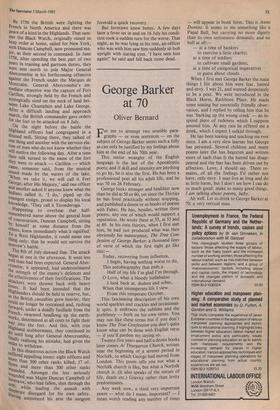George Barker at 70
Oliver Bernard
For me to attempt two sensible para- graphs — or even sentences — on the subject of George Barker seems such a folly as can only be justified by my feelings about him at the end of his 70th year.
This senior wrangler of the English language is the last of the Apocalyptic poets; and if skill and intensity are anything to go by, he is also the first. He has been a professional poet all his adult life, and he was 70 on 26 February.
George looks stronger and healthier now than he did at 50 or 60, yet since the Thirties he has lived practically without stopping, and published a dozen or so books of poems with Faber. He has, besides, written three poems, any one of which would support a reputation. He wrote these at 35, at 55 and at 69. In his own thirties, when I first met him, he had just produced what was then obviously his masterpiece, The True Con- fession of George Barker: a thousand lines of verse of which the first eight go like this:—
Today, recovering from influenza, I begin, having nothing worse to do, This autobiography that ends a Half of my life I'm glad I'm through. 0 Love, what a bloody hullabaloo I look back at, shaken and sober, When that intemperate life I view From this temperate October.
This fascinating description of his own world sparkles and crackles and occasional- ly spits. It embraces the sublime and the gorblimey — both on his own terms. You may not like these terms but if you don't know The True Confession you don't quite know what can be done with English verse — if you'll pardon my saying so. Twenty-five years and half a dozen books later comes At Thurgarton Church, written near the beginning of a serener period in Norfolk, to which George had moved from London. This poem tells you not what a Norfolk church is like, but what a Norfolk church is. (It also speaks of the nature of life, death etc.) Gravity rather than levity predominates.
Any week now, a third very important poem — what do I mean, important? — I mean worth reading any number of times
— will appear in book form. This is Anno Domini. It seems to me something like a
Papal Bull, but carrying no more dignity than its own seriousness demands; and no bull at all:- - at a time of bankers to exercise a little charity; at a time of soldiers to cultivate small gardens; at a time of categorical imperatives to guess about clouds . . .
When I first met George Barker the main things I felt about him were fear, hatred and envy. I was 21, and wanted desperately to be a poet. We were introduced in the Black Horse, Rathbone Place. He made some teasing but essentially friendly obser- vation, and I replied by telling him that he was 'barking up the wrong creek' — an in- spired piece of rudeness which I suppose amused him. At any rate he offered me a drink, which I expect I sulked through.
He has been teasing and teaching me ever since. I am a very slow learner but George has persisted. Several children and many poems later (he has begotten and written more of each than I) the hatred has disap- peared and the fear has been driven out by affection. Love, I should say. There re- mains, of all the feelings I'd rather not have, only envy. I may live as long and do as little harm, but I don't see how I can do so much good: make so many good things. I am talking about poems, baby.
Ah well. Let us drink to George Barker at 70: a very vertical man.














































 Previous page
Previous page